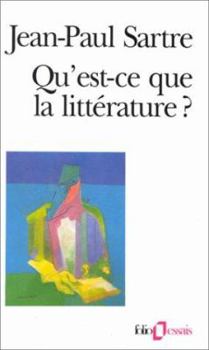Qu Est Ce Que La Litter
Select Format
Select Condition 
Book Overview
"What is Literature?" remains the most significant critical landmark of French literature since World War II. Neither abstract nor abstruse, it is a brilliant, provocative performance by a writer more... This description may be from another edition of this product.
Format:Paperback
Language:English
ISBN:2070323064
ISBN13:9782070323067
Release Date:May 1985
Publisher:Gallimard Education
Length:307 Pages
Weight:0.45 lbs.
Dimensions:0.5" x 4.2" x 6.9"
Customer Reviews
2 ratings
Better than i expected
Published by Thriftbooks.com User , 14 years ago
Like most other people, I first read Sartre early in my time at college- Nausea, Being & Nothingness, Words. And I was, of course, smitten by this man who understood so well my experience of isolation, freedom and how irritating it is when tools don't work properly and when other young men and women looked at me. And then, like (I hope) most other people (including, it must be said, Sartre), I got over it, realized that the world existed neither to irritate me nor to coddle me, and that there were more important things than the state of my Existence. So I didn't exactly have high expectations of this, and was very pleasantly surprised. Sartre's argument is based on a pretty dodgy philosophy, but quite valid feelings: anger at injustice, love of literature. Like most philosophies of literature, he makes absurd and stupid generalizations (the poet 'considers words as things, not signs' and so isn't like a 'writer'), but at least his largest generalization isn't an insult to human beings: the act of writing, he argues, is an act of freedom addressed to other free humans who happen at present to be in terrible situations of unfreedom. The relation between writer and reader can be an ideal image of a world in which people aren't forced to work in jobs they hate, or do anything else they hate for that matter. I'll take that over 'the act of writing is the putting into question of literature' any day. "The work of art, from whichever side you approach it, is an act of confidence in the freedom of men." And, I assume, women. So Sartre argues that the writer is addressing both a real public - the people who do actually read her - and a virtual public, the people who could conceivably read her. In different historical periods these two audiences will more or less match up: when the society is one of minimal freedom for most people (Sartre's example is the 17th century), the virtual audience is more or less absent; when the society has the potential for greater freedom, the virtual audience expands (e.g., modernity.) But in any case, the writer must address her 'virtual' public through her real one. Abstract palaver has no place in Sartre's theory. He follows this up with a great history of 20th century literature in France, which is basically a critique of surrealism and the communist party (it's important to note the latter, since everyone - including myself up till now - seems to think Sartre was a Stalinist), and the last chapter is a rousing call for writers to care about what they do.
Sartre-tastic
Published by Thriftbooks.com User , 17 years ago
If you enjoy contemplating the human condition, particularly in the realm of aesthetics and morality, then this collection of Sartre essays is one way to go. You may not agree with him entirely -- in fact, you shouldn't; philosophical thought and discussion hinges on disagreement, or only partial agreement -- but he provides useful vocabulary and concepts.






